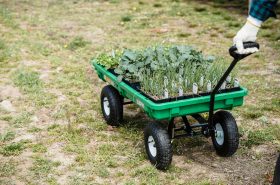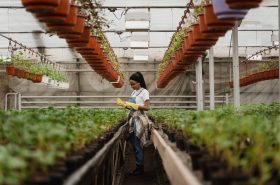Written by: Christina Vestey
My name is Ms Rosemary Olive Mbone Enie. I am a Cameroonian Geologist, Environmentalist, Social Environmental Entrepreneur (SEE), Eco-communities Builder, Gender and Childhood Ambassador. I was born on the 27th August 1966 in Victoria South West Region of Cameroon.
Victoria, now called Limbe, is a seaside town by the banks of the Atlantic Ocean. While growing up, we had several clean flowing rivers, which took its source of the ranges of the majestic Mount Cameroon through the rocky volcanic terrain into the Atlantic Ocean. Back in the youthful days’ rainfall was stable, farmers had specific reasons to plant their crops, and the yields were moderate. The town of Victoria (Limbe) was full of trees and plantations of Oil Palm owned by the Cameroon Development Corporation (CDC) and other local farmers. The city’s average temperature was moderate, and Victoria was a liveable city with an average population size.
For the past 50 years, there has been a rapid change in the development of the city of Limbe. The population has grown so fast, hitting over 500,000 inhabitants. They felled many trees to build houses. The city’s average temperature has become very hot, especially in the long dry season. Rainfall is very erratic, which sometimes extends to October and November. Many rivers and streams dry out during the rainy season giving rise to water shortages within the communities. Farmers have resorted to using chemical fertilizers to improve their yields, which harms the community’s health. Like many African countries, Cameroon faces the challenge of Water Security, food security, loss of biodiversity, etc. My country is already facing consequences of climate change, including an abnormal recurrence of extreme weather phenomena such as violent winds, high temperatures and heavy rainfall, which endanger communities’ ecosystems and the services they provide.
For the past 30 years, I have been taking practical actions to address Water, Sanitation, Hygiene, Environmental Education and Management activity across Africa. As a result, I had the opportunity to work with women and youth groups in Cameroon, Nigeria, Ghana, Liberia, Tanzania, Kenya and Rwanda. I kick-started several Pan African initiatives to address environmental and climate change challenges in Africa. I received a scholarship to study Ecovillage Design Education at UNESCO in Germany. It led me to initiate the Pan African Eco-communities Network (PEN) Initiative to transition 55,000 traditional African villages into Ecovillages. In addition, I started the Tunza Afrika Program (TAP) in 2015, which continues to engage, promote and support the interest of young people in water, environment, energy, food, science and technology issues within the formal non-formal educational sectors across Africa.
Climate change poses a unique and general challenge within Africa and at the global level. It concerns everyone on planet Earth. The people likely to suffer most from the impacts of climate change are the Most Vulnerable Groups (MVGs), those least responsible for causing it. It is widely recognized that developing countries are expected to suffer more from the devastating effect of climate change. For example, the African continent is responsible for 3.8 per cent of global CO2 emissions, yet the impact of climate change will be unfairly devastating.
For over 25 years, I have been working in the Gender and Development Sector and 21 years following the International Climate Change Negotiation. Women are particularly affected by the dramatic changes in climate patterns. Women living in poverty are the most threatened by the dangers that stem from global warming. For example, in 1991, when a cyclone and flood severely affected Bangladesh, the death rate was almost five times as high for women as for men. This was also obvious during the Tsunami that hit South-East Asia in 2006, where most victims were women.
Due to the existing gender inequalities, the different roles in society and the division of labour, women and men are not equally exposed to climate change impacts. They do not have the same adaptive capacities. We must acknowledge these differences in vulnerability and adaptive opportunities to ensure the success of adaptation measures. Furthermore, if we consider the gender perspective in communities across Africa, we will avoid further gender inequality.
A gender perspective is often overlooked in debates about climate change across Africa; it is high time to change this with COP 27 in Cairo, Egypt!
Gender analysis is crucial to understand better the impacts of climate change on human communities, particularly food security, access to natural resources, such as water, firewood, and health. Simply because women are often primarily responsible within the family for these tasks. In African countries, the women fetch and carry water at great distances to meet the needs of their village communities. They labour every day, without pay, to grow enough food for their families and communities.
Women can be real agents for change in their homes, their communities, and society as a whole in the continent of Africa. They can take over new renewable forms of household energy, such as biomass, biogas, solar. They can tackle climate change as consumers, as an educator. Their specific role in educating their children can promote behavioural change in human or economic, cultural, social and environmental activities.
When climate change impacts African women, it also affects me as an African woman!





Jean de Dieu
Best before Dear Mme Rose.Conglaturations for these achievment.
Vincent
Madam Rosemary, thank you for the commitment and hard work for our community . We are ready to give maximum support to achieve this collectively. Thank you
Quinta Yuochi
I am glad to read this. I am inspired to contribute to Climate action
Quinta Yuochi
I am glad to read this. I am inspired to contribute to Climate action and will continue to follow your work